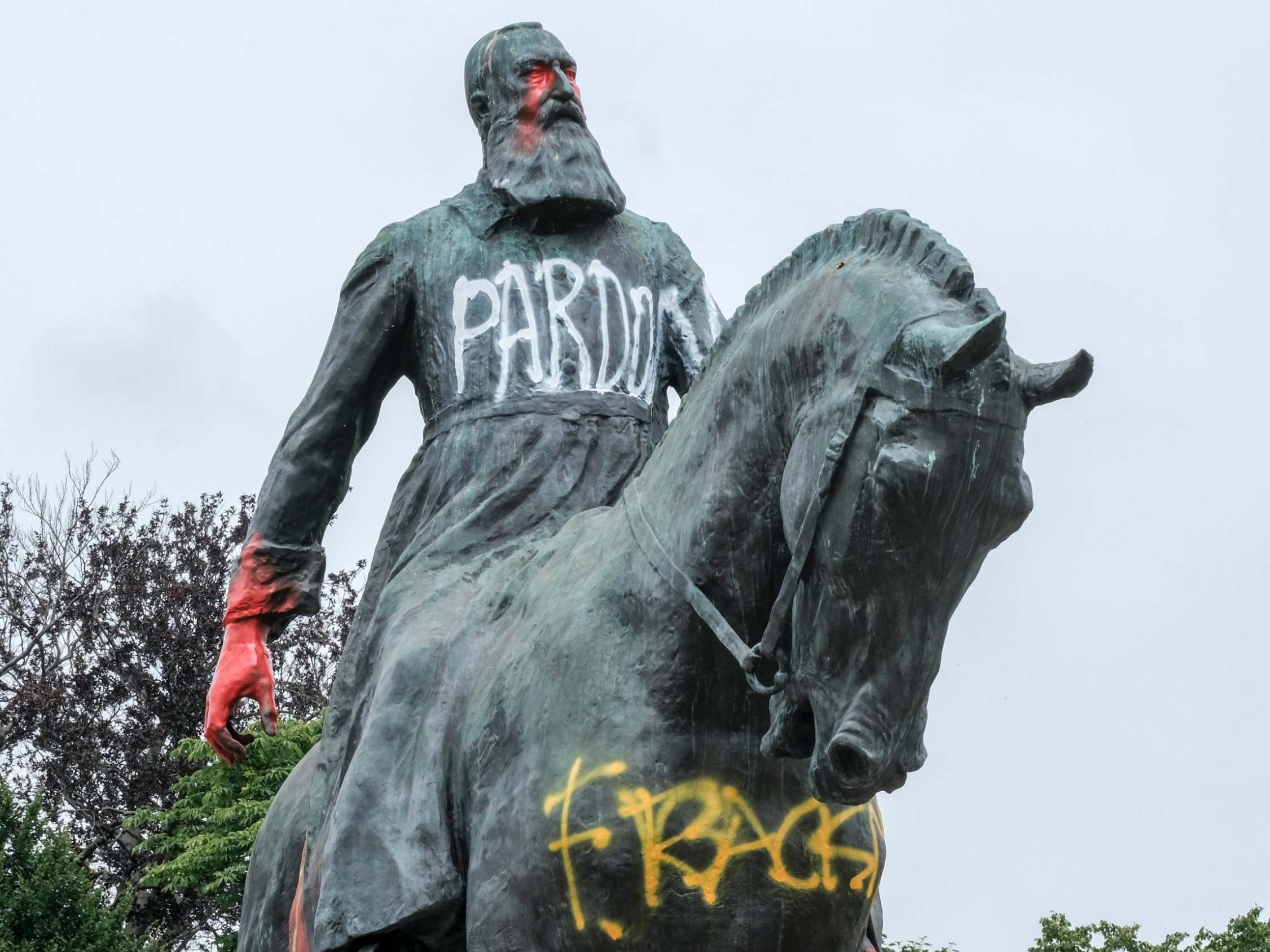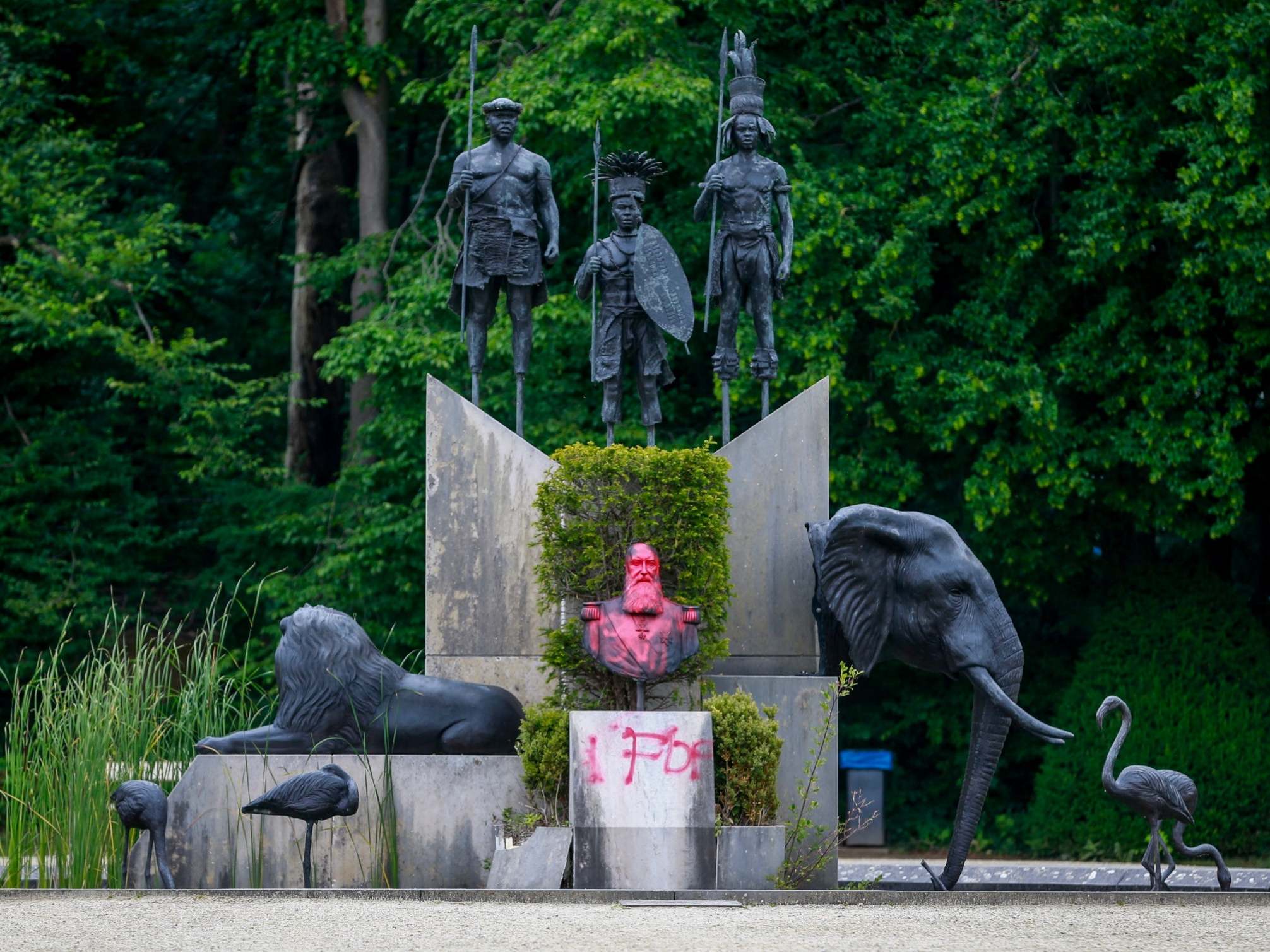A nation’s colonial past is not just history – it resonates today. We forget that at our peril
The protests in Belgium show that the King Leopold’s legacy, and those of others like him are not something we can just put aside


Your support helps us to tell the story
From reproductive rights to climate change to Big Tech, The Independent is on the ground when the story is developing. Whether it's investigating the financials of Elon Musk's pro-Trump PAC or producing our latest documentary, 'The A Word', which shines a light on the American women fighting for reproductive rights, we know how important it is to parse out the facts from the messaging.
At such a critical moment in US history, we need reporters on the ground. Your donation allows us to keep sending journalists to speak to both sides of the story.
The Independent is trusted by Americans across the entire political spectrum. And unlike many other quality news outlets, we choose not to lock Americans out of our reporting and analysis with paywalls. We believe quality journalism should be available to everyone, paid for by those who can afford it.
Your support makes all the difference.The Democratic Republic of Congo (DRC) is the largest country in sub-Saharan Africa. It has vast reserves of copper, diamond and cobalt ore – one of the most sought after minerals in the world today – as well as being rich in flora and fauna.
It is also one of the poorest countries in the world. According to the UN Human Development Index of four years ago, the DRC is the 176th least-developed country out of 188 in the world. More than 80 per cent of Congolese people live on what is defined as the threshold of extreme poverty. Violent conflicts of various types, drawing in fighters from neighbouring countries, have been going on for decades.
The protests taking place in the US and Europe, following the killing of George Floyd by police in Minnesota, has seen the pulling down of statues associated with slavery and colonialism. This has led to predictable controversy and acrimony which is set to continue with the plans by various local area authorities to remove other such effigies.
Around 12,000 protestors who took to the streets in Brussels this week targeted the statue of Leopold II astride a horse outside the royal palace, with people climbing on top and waving the Congolese flag. Another one was set on fire at Antwerp and a bust of the late king splashed with red paint in Ghent.
Some people may not even know that Belgium had an empire with a land mass equivalent to it stretching from the Baltic to the Black Sea, 76 times the size of Belgium itself. Or that for a long time it was run as the personal fiefdom of King Leopold. Or that up to 15 million people Congolese died at the hands of their colonial masters. And that a standard punishment for workers, including children, included amputations and executions for failing to fulfil their work quota of collecting rubber.
An endless seam of riches flew from Congo to Belgium. This, of course, was also the case with other European nations, including Britain, which were busy ruthlessly exploited lands they had conquered. But Leopold’s plunder was on an industrial scale. It provided him with a personal fortune which he used on lavish spending on himself, with expansions of his palaces and acquiring properties at home and abroad, such as country estates in the French Riviera. The king was also generous to his favourites like his mistresses, one of them a French prostitute aged 16.
But the state benefited too, with money from the Congo helping with Belgium’s rapid industrialisation. The king also carried out grand building projects, including Cinquantenaire arch alongside what is now the EU Commission building, the National Basilica and the dome of the Palace of Justice in Brussels.
Leopold, however, was giving colonialism a bad name. Other European powers pressed the Belgian government to act. Joseph Conrad’s Heart of Darkness was published in 1899 with its portrayal of horror and violence in the Congo. There were tales of barbarity by the security forces and their local cohorts emerging from missionaries and travellers. The parliament in Brussels took over administration of the Congo from Leopold in 1908. Crowds booed the funeral cortege of the king when he died later.
There were concerted attempts to rehabilitated Leopold’s image and many of the statues to him were put up in subsequent decades. The defence for this is that these were different times with different outlooks. That is true.
It was a time when Winston Churchill was declaring “I am strongly in favour of using poisoned gas against uncivilised tribes” and stressing that no wrong had been done to people whose land had been taken by white colonists “by the fact that a stronger race, a higher-grade race, a more worldly-wise race to put it that way, has come in and taken their place.”

There were some improvements in the life of the Congolese after the Belgian state took over and organised administration. But the fact remains that there were just a few high schools and not one local university when the country finally gained independence in 1960.
At the independence ceremony, King Baudouin told the assembled Congolese to live up to the standards of Belgian rule. “It is your job, gentlemen, to show that we were right in trusting you” he advised. One could say that this presumably meant that as long as they did not kill more than 15 million people, and kept looting to King Leopold’s levels, they would pass the test of colonial governance.
Baudouin’s exhortation is in line with one key aspect of the narrative trotted out by defenders of colonialism. That is that the European powers left their colonies peaceful and stable, and that they were then ruined by corrupt and incompetent local rulers who took over.
There is certainly a degree of truth in this. But what this account does not mention was that many of these venal and corrupt leaders who took over were propped up by the west, often by the former colonial masters, because it suited their economic interests. There was also a political motive during the Cold War with Russia.
Reactionary forces, often religious ones, were used – sometimes violently. Progressive leaders who tried to carry out reforms and wealth redistribution were perceived to be harming these interests. Those who sought to nationalise western-owned industries and businesses were particular targets.
In the Muslim world this meant the west colluding with hardline Islamists. Britain attempted to combat the “virus of Arab nationalism”, after Gamal Abdel Nasser came to power in Egypt and in 1956 nationalised the Suez Canal, by forging links with the Muslim Brotherhood, an organisation involved in terrorism.
The nationalisation of the Anglo-Iranian Oil Company by the democratically elected Iranian government of Mohammed Mossadeq led to a British-American organised coup in 1953 which was facilitated by Ayatollah Seyyed Kashani, one of whose followers was the young Ruhollah Khomeini. In Indonesia, the removal of Ahmed Sukarno in 1967 in another military coup by the UK and US was carried out with the help of Darul Islam. Its followers went on to massacre socialists and trade unionists.
There was an unforeseen, and deadly, consequence. The west could not control the extremist and aggressive Islamism it had helped to nurture and empower. Now we have adherents of that same creed carrying out jihad, bombings and shootings on the streets of Europe and America.
In Congo the democratically elected prime minister, Patrice Lumumba, was removed in the early 1960s by the Belgians with the help of the Americans. The Eisenhower administration decided that the young leader was too left-wing, and worried that he would bringing Russian influence into central Africa.
It is true that the prime minister had turned to Moscow for help in face of growing Belgian orchestrated destabilisation, but only after being turned down by Washington. Lumumba denied he was a communist, wanting to stress that he considered communism and colonialism to be equally deplorable. But that was not enough; he was overthrown, tortured and then murdered.
We now know that Belgian personnel were involved in each stage of the way. Documents surfaced of orders from the Belgian government asking for Lumumba’s execution and that it had taken close interest on how it was carried out including the composition of the death squad.
In the US, the Church Committee concluded in 1975 that CIA chief Allen Dulles had ordered Lumumba’s killing. The committee later said that while the CIA had conspired to kill Lumumba, it was not directly involved in the murder. There was apprehension that John F Kennedy, who had just won the 1960 presidential election, would taken an interest in the case and may demand his release and may even insist that he is back into politics. The murder took place three days before JFK’s inauguration.
The Belgian government formally apologised in 2002 for its role in Lumumba’s assassination and donated €3.75m to create a Patrice Lumumba Foundation to finance “conflict prevention” projects and education grant for Congolese youth. There has been no apology from the US about its part in the affair.
The US and Belgium supported Colonel Joseph Mobutu, who had carried out a coup, as the successor. He was presented as a bulwark against communism. Mobutu’s kleptocracy robbed the country of up to $15bn during his three decades in power and institutionalised corruption.
He maintained, overall, good relations with the west. Belgian and French troops were flown in to suppress one of the rebellions against him. Mobutu He was overthrown in 1997: the country then went through a prolonged conflict drawing in six states and left around 4 million people dead.
Belgium, of course, is just one of many colonial powers, and it did not have the large swathe of colonies like some of the others. It came late on the table for “a slice of the magnificent African cake” as King Leopold put it. And it may have been the need to catch up rapidly on the rich repast which led to the brutality of the methods used.
Colonies of other European powers also experienced oppressive regimes. Some have emerged in better shape than others. Prominent Congolese figures have stressed that the current ills of the DRC cannot all be blamed on Belgium: as have people in other countries about their colonial masters.
But what has been happening in the recent days show that the King Leopold’s legacy, and those of others like him are not just matters for the history books. They resonate today. Likewise Donald Trump’s refusal to allow renaming US army bases from those of Confederate generals who had fought to preserve slavery.
The president believes the move will help him in the coming presidential election. What has happened in the past remain very much alive in 21st-century politics.
Join our commenting forum
Join thought-provoking conversations, follow other Independent readers and see their replies
Comments